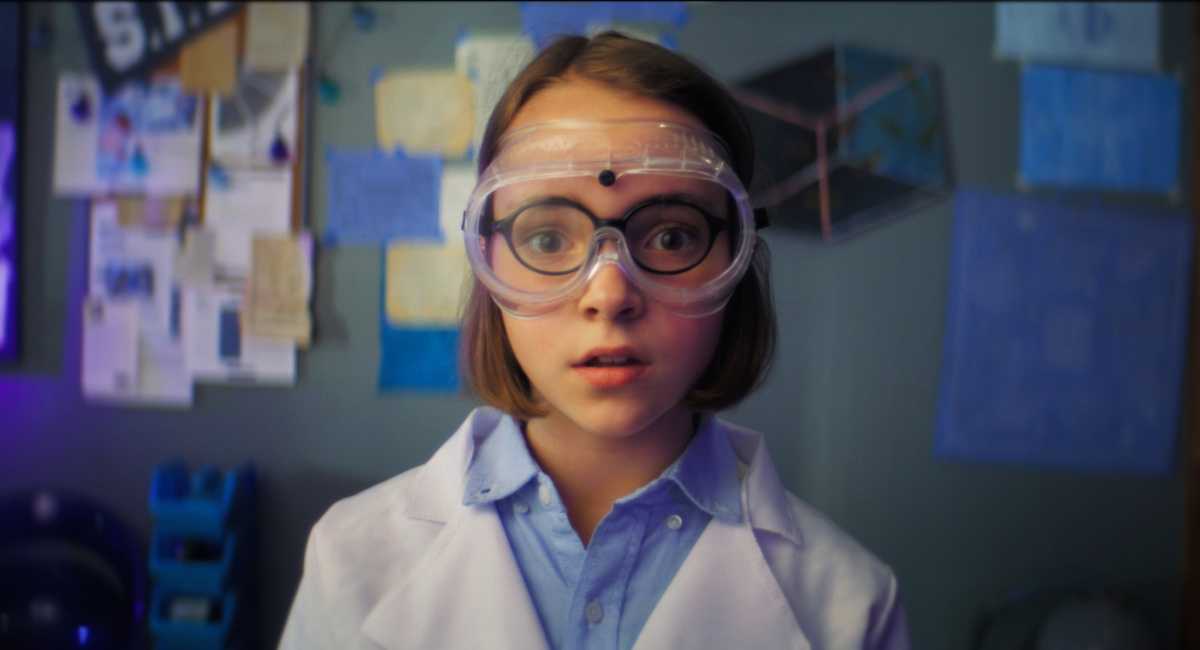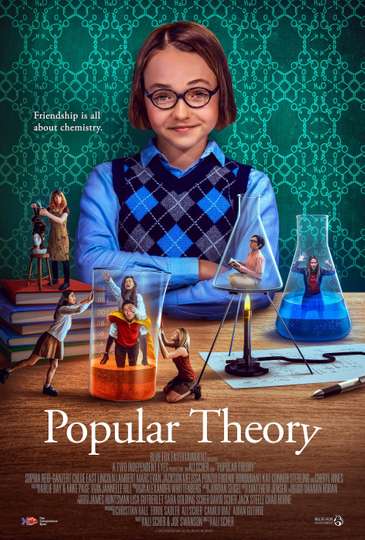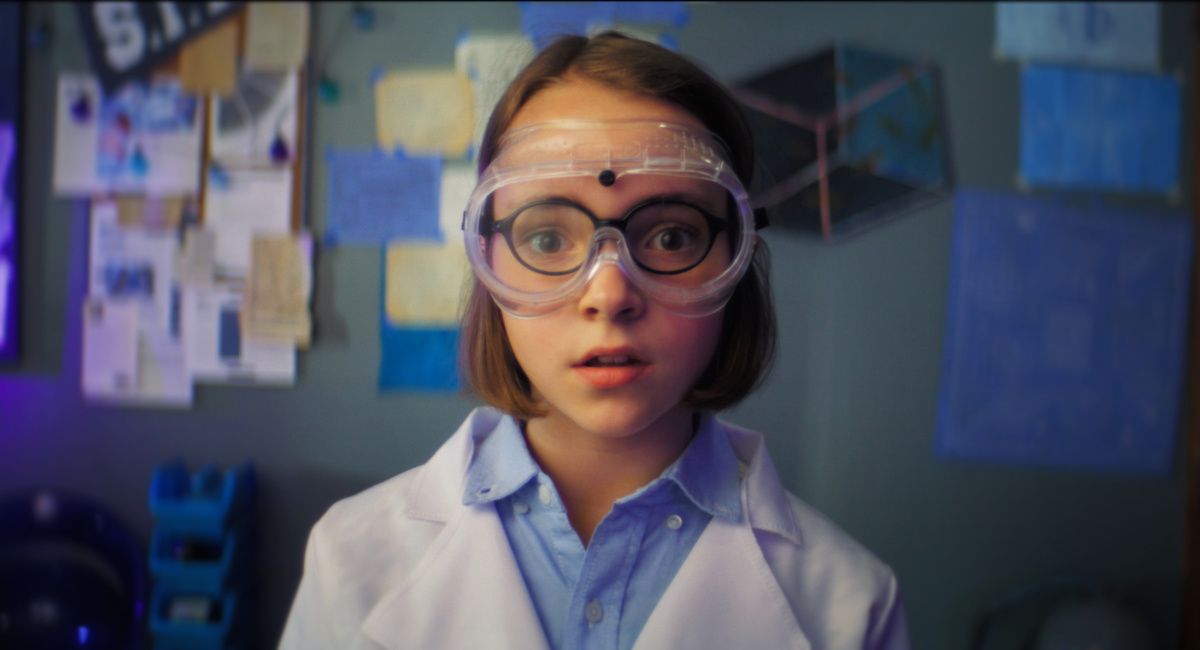
Sophia Reid-Gantzert in ‘Popular Theory.’ Photo: Blue Fox Entertainment.
Opening in theaters on February 9th is the new family film ‘Popular Theory,’ which was directed by Ali Scher, and stars Sophia Reid-Gantzert, Cheryl Hines (‘Waitress’), Chloe East (‘The Fabelmans’), Marc Evan Jackson (‘Kong: Skull Island’), and Lincoln Lambert (‘Nope’).
Moviefone recently had the pleasure of speaking with director Ali Scher, and actors Sophia Reid-Gantzert and Cheryl Hines about their work on ‘Popular Theory,’ developing the screenplay, the themes of the movie, the amusing characters, Erwin’s friendship with Winston, Aunt Tammy’s parental skills, collaborating on set, if they’ve ever had to give up something they loved doing, and if they would chew special gum to make you popular.
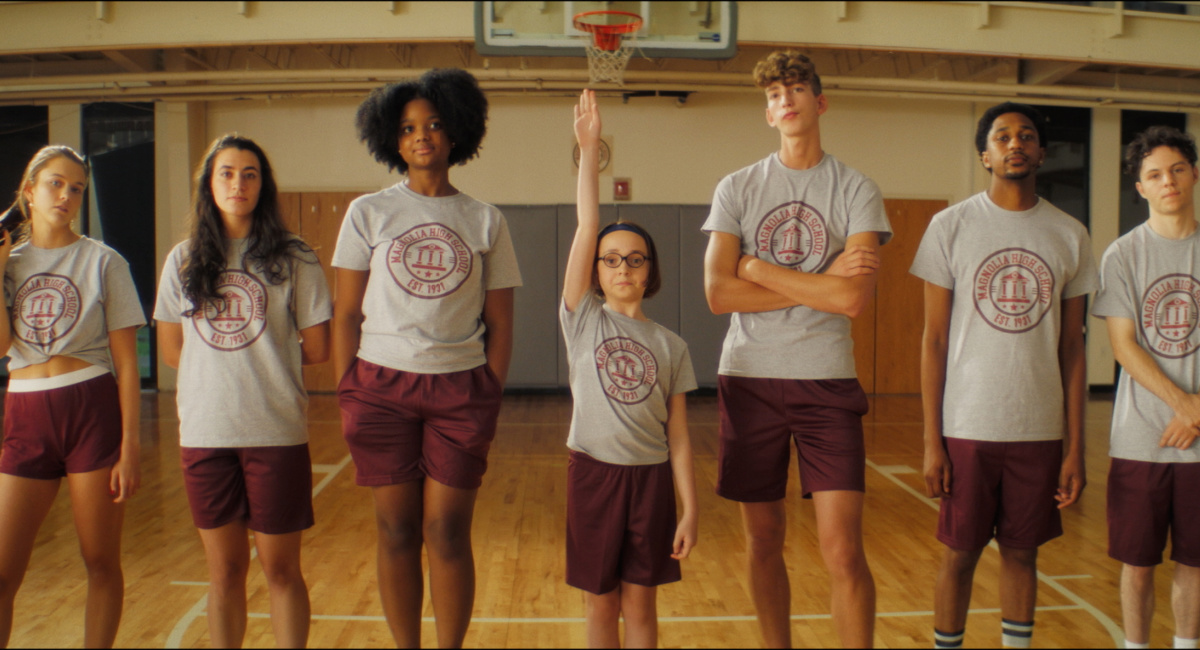
(Center) Sophia Reid-Gantzert in ‘Popular Theory.’ Photo: Blue Fox Entertainment.
Moviefone: To begin with, Ali, can you talk about developing the screenplay and the themes of adolescence that you wanted to explore as a filmmaker with this movie?
Ali Scher: I grew up as a science nerd, and I was excited to get to tap into that version of myself and the part of me that got made fun of and teased a lot for using big words and for doing well in science. But I think at the crux of the idea, the crux of what excited me about this film is the theme of connection, the idea that you don’t need a ton of friends to be happy, but you do need someone, like someone who gets you, someone that you can relate to, someone that you can talk to, and that someone doesn’t need to be a love interest. This is a family film, and there aren’t a lot. I watch a lot of family films. I would consider myself an aficionado, and they always have love interests. There’s always the popular boy that there’s the crush on. My producers were a little bit nervous. They were like, “Are you sure you don’t want there to be a love interest, or there to be something between Winston and Erwin?” I was resolute on that because I don’t think we need to be sending the message to young girls that there always must be a boy, and that must be the end goal. Erwin’s goal is to work with a particle accelerator. That’s what she wants. She wants to go to work with a particle accelerator, and what’s wrong with that goal?
MF: Sophia, how would you describe Irwin in your own words and what was it like for you to play this character?
Sophia Reid-Ganzert: To me, the character came naturally to me, especially after talking with Ali at a little mini table read. I was like, “Okay, this really helped.” I feel like Erwin, though she has an insanely high IQ, she can be a bit stubborn at times. I think she can be very stubborn. When she’s like, “Well, I didn’t need a partner anyways.” No, you do. You do need a partner. So, I really wanted to show that she has flaws, as well, because I really like it when leads in movies have flaws and they’re not just perfect, and it’s only the side characters that have personal development. I really wanted to be able to show that.
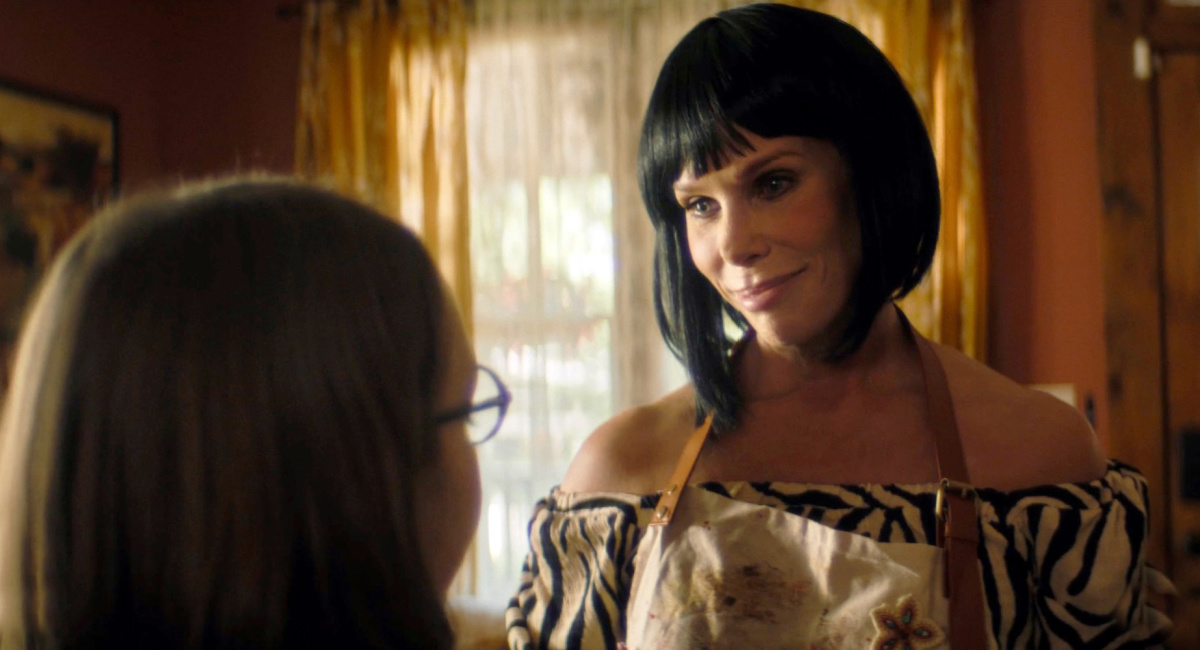
(L to R) Sophia Reid-Gantzert and Cheryl Hines in ‘Popular Theory.’ Photo: Blue Fox Entertainment.
MF: Cheryl, can you talk about why Aunt Tammy decides to take science away from Irwin and her overprotective parenting skills?
Cheryl Hines: I think as an aunt who’s bringing up her niece, she could see that Erwin didn’t have any friends and was struggling in the world of trying to fit in, and “Who am I?” So, as a misguided attempt, which we do as parents, Tammy decided, “Oh, it’s science that’s really blocking her from being the best person she can be.” So, Aunt Tammy brings down the hammer and says, “No more science,” which is funny, but also speaks to Ali’s writing, because as parents sometimes we don’t really see what’s happening. We think we see what’s happening, and then we think we know the answer of how to fix it, but we’re not always right.
MF: But ultimately, she really loves Irwin, correct?
CH: Yeah, that’s exactly where it comes from because you can see that Erwin needs to emotionally develop and socially develop. That’s part of growing up and going to school, and you want to see that for your kids. You want your kids to be happy, you want them to have play dates and best friends, and you want that for them. As much as you tell them to do it, it just doesn’t work that way.
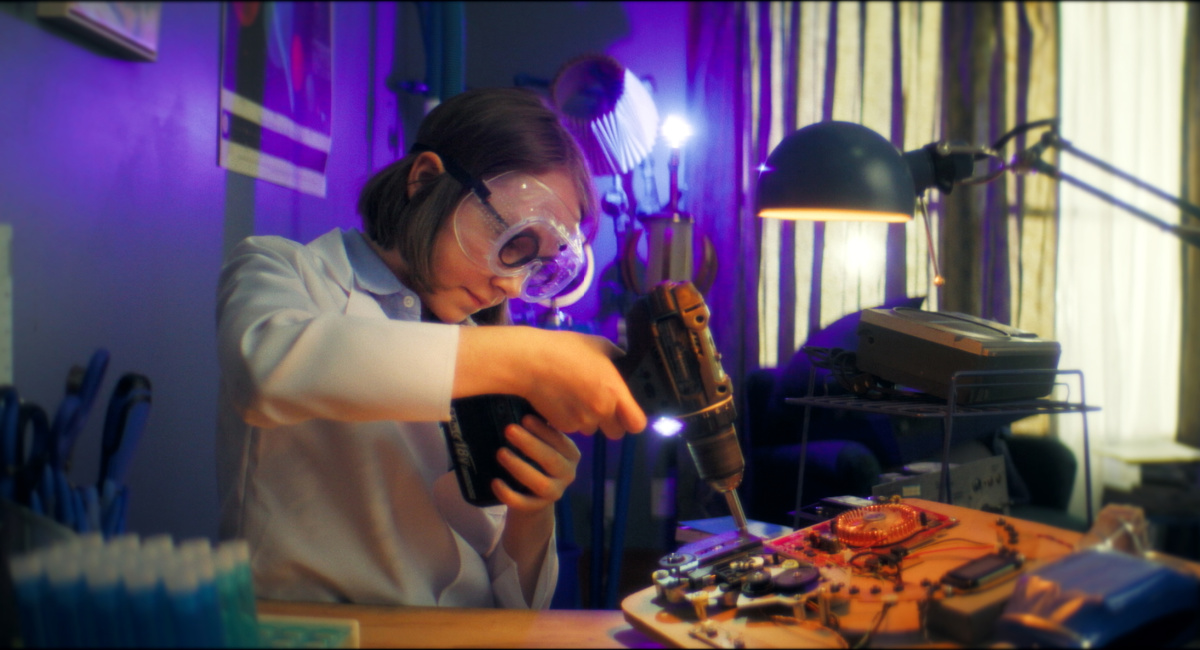
Sophia Reid-Gantzert in ‘Popular Theory.’ Photo: Blue Fox Entertainment.
MF: Sophia, how does Irwin feel when Tammy takes science away from her, and can you talk about the friendship she eventually forms with Winston?
SRG: I felt like it was important to show how much science meant to her, and that is very clearly shown in the script, as well. But that scene is kind of very important, because if you don’t really show that, then they’re like, “Okay, well, why is she still trying to hide the fact that she’s doing science? Just don’t do it.” Also, like I said about her being kind of stubborn, she’s like, “I’m not going to be friends with you. We’re just going to be professional partners.” But obviously, they become friends, because they get along so well and they understand each other, no matter how much she wants to deny it. I thought it was just fun to be able to show their friendship arc, how they slowly start understanding each other. That’s also shown through their clothes. I absolutely love the color theory in the movie. When I saw it, and when Ali explained it, I got so excited. I was like, “Oh my gosh, this is so exciting.” Because Erwin’s color is blue, and then Winston’s color is orange. As they slowly start becoming friends, Winston starts wearing blue, and she starts wearing orange, because they get integrated into each other’s worlds, which I love.
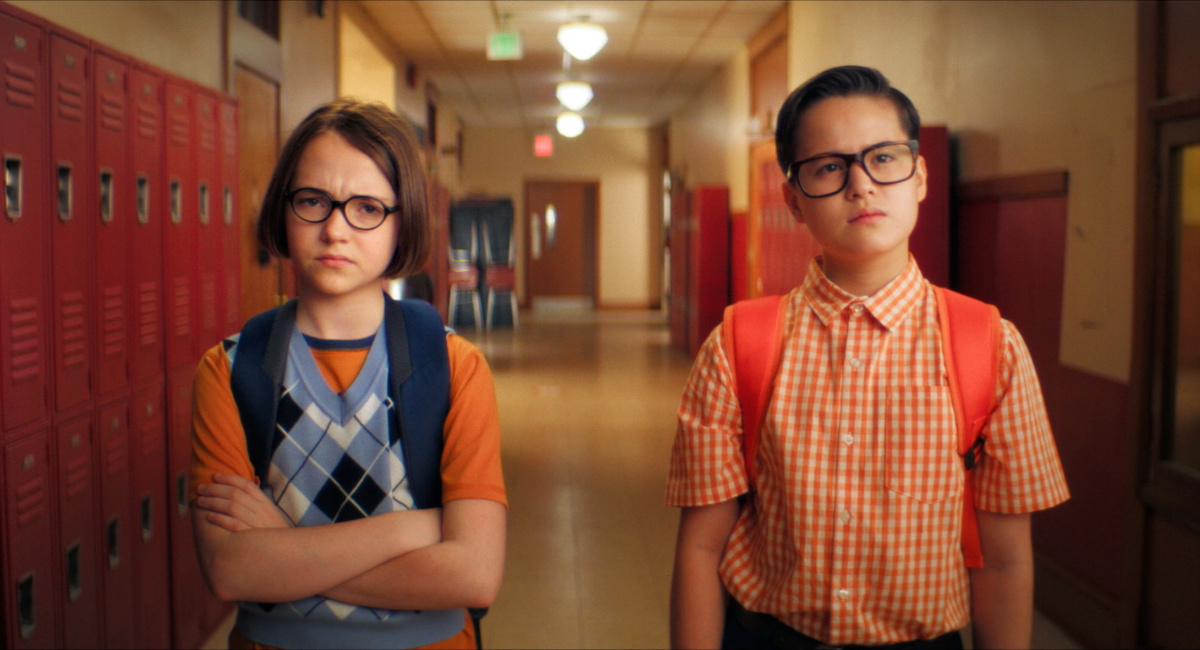
(L to R) Sophia Reid-Gantzert and Lincoln Lambert in ‘Popular Theory.’ Photo: Blue Fox Entertainment.
MF: Ali, can you expand on that and talk about the way you used color in the movie?
AS: The way I like to think of it is, Erwin is an iceberg. She’s blue, and there’s nothing else in the whole world of the movie that’s blue. It’s all a warm color palette. We don’t even really have purples. It’s an entirely warm color palette. The idea is that as she meets and befriends Winston, she slowly melts. Her iceberg melts, and it fuses with his, and it’s not the rest of the world that seeps in, but it’s him that seeps in, his color palette that seeps in. Then when she starts using the gum and she starts having these false connections through the gum, it goes away, and she reverts to all blue. She’s back to being an iceberg, even though she’s trying hard not to be one, but it’s like she’s going about it the wrong way, and the color tells you that. I’m a really big fan of using color as a tool to tell the thematic story of the film. I remember I had a professor in grad school that told me that everything you do in a movie is a choice, even if you didn’t make a choice, so try and make those choices. Use those as opportunities. So, I loved that, and I try. I do my best, at least, to think of everything I could, every choice I can make, and make that choice, because choices are fun. I remember when I initially talked to Sophia about it, she was jumping out of her skin excited about the color story. The scene that you were talking about, when Tammy takes away science from Erwin, and watching that scene being shot, watching it in the monitors, that was the moment I was like, “Oh, this movie is going to work. This film is going to work.” I didn’t even understand how important that scene was until we shot it. First, having an actress like Cheryl, who gives you something completely different on each take, and editing her is so fun, because it’s like you’re just crafting this performance and you have so many choices. I couldn’t even tell you. I don’t think I’ve ever worked with anyone like her before. I haven’t worked with anyone like her before who does that. Then with Sophia, and her tapping into the emotion of that scene, it is everything to her that this is getting taken away. This means so much to her. She sells that in the scene, and you know when you’re watching that, it’s like, “Oh, the stakes are high.” She sets the stakes in her performance. I couldn’t be happier with my casting.
Related Article: Larry David Wants to Make More ‘Curb Your Enthusiasm’
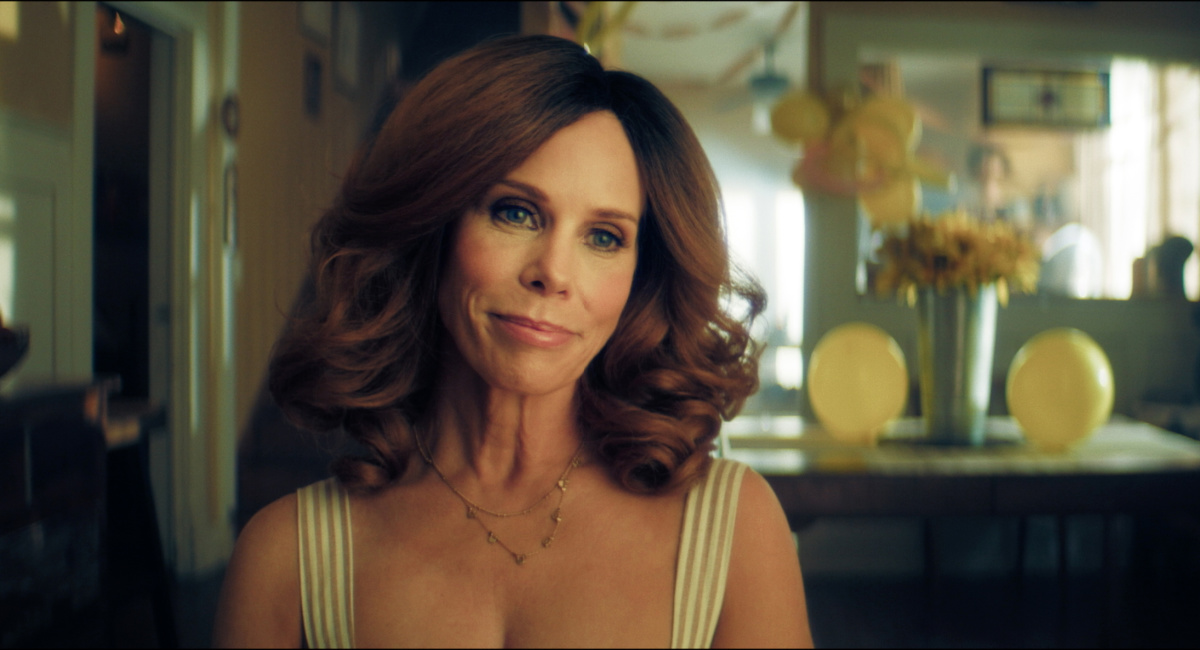
Cheryl Hines in ‘Popular Theory.’ Photo: Blue Fox Entertainment.
MF: Cheryl, can you talk about collaborating with Ali as a filmmaker and what are you looking for from a director on set?
CH: I loved working with Ali, because I love that she’s very focused on what she wants, how she wants it to look, how she wants it to feel, and at the same time gives you, meaning the actor, your own space to also bring something to it. It’s a fine line with directors. I mean, sometimes you have somebody who’s so controlling and wants to do it only this way, but the idea that she knows exactly what she wants, and at the same time, wants to see what you’re doing, it was fun.
MF: Sophia, did you have fun making this movie?
SRG: Definitely. I don’t think there was ever a moment on set where I wasn’t having fun. That means a lot because during the filming process, I got sick, and even then, I was like, “Woo, we’re on set.” It was so much fun. Every single scene was fun to film. I was just so excited to get the film made and then be able to see it. I was like, “Okay, come on. I want to see it already.”
MF: Cheryl, have you ever had to give up doing something you love, like the way Irwin had to give up science in the film?
CH: Well, this is ridiculous to say but I’ll just say it. When I was in high school, because I’m Catholic, I gave up gossiping for Lent. At the time I thought, “Oh, this is going to be easy.” But it changed my life. But that is something you should give up. Science is something you should not give up. But gossiping is something that, it was a good lesson for me to learn, and I don’t do it anymore. But that was one thing that I did not want to give up, but I did.

A scene from ‘Popular Theory.’ Photo: Blue Fox Entertainment.
MF: Cheryl, if you were back in high school, would you want to chew a gum that makes you more popular?
CH: I needed it. I was sort of a super nerd. I was in chorus and theater, so that’s a one-two punch. If I could have chewed gum, walked into the cafeteria, sat down wherever I wanted to, I would’ve had so many packs of gum in my backpack. You wouldn’t believe it.
MF: Sophia, would you want to chew Irwin’s special gum? What do you think the advantages and disadvantages of that would be?
SRG: I don’t know, I think if you had asked me that a year ago, I would’ve said yes. But now, I don’t know. I’m a massive believer, especially now, with if you be yourself, the right people will find you or you’ll find the right people, because there’s no point in pretending to be someone else and then surrounding yourself with people that you find boring or that just make fun of you. I don’t think I would use it.
MF: Finally, Ali, is the moral of the movie just be yourself and people will like you for who you are?
AS: I think it’s a lot of what Sophia said, which is the idea that you’ll find the right people if you are yourself. The idea that, like I said, connection is everything, and you don’t need a ton of people, but you need somebody. I think finding that somebody is everything.
Erwin, a girl genius, is the youngest student in high school. Unfortunately she struggles with social isolation. When she meets fellow science guru, Winston, they… Read the Plot
What is the Plot of ‘Popular Theory’?
12-year-old Erwin (Sophia Reid-Gantzert) is a genius, far smarter than any of her high school classmates. But Erwin’s genius has come at a price: isolation. She doesn’t have any friends and even her sister thinks she’s a social leper. Determined to win the State Science Fair, she teams up with classmate Winston (Lincoln Lambert), a fellow outcast and chemistry guru, to create a popularity chemical which they add into sticks of chewing gum.
Who is in the Cast of ‘Popular Theory’?
- Cheryl Hines as Tammy Page
- Sophia Reid-Ganzert as Erwin Page
- Chloe East as Ari Page
- Lincoln Lambert as Winston Wilkinson
- Marc Evan Jackson as Arthur Page
- Eugenie Bondurant as Mrs. Cornbee
- Kat Conner Sterling as Casey
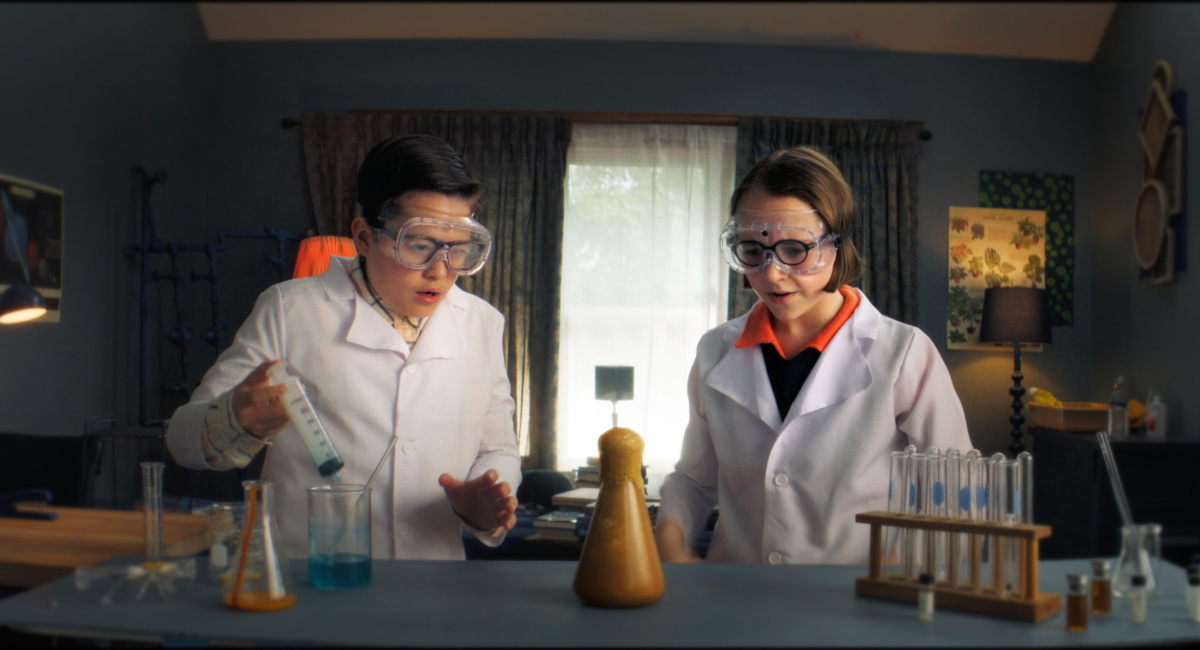
(L to R) Lincoln Lambert and Sophia Reid-Gantzert in ‘Popular Theory.’ Photo: Blue Fox Entertainment.
Other Movies Similar to ‘Popular Theory’:
Buy Tickets: ‘Popular Theory’ Movie Showtimes
Buy Cheryl Hines On Amazon
